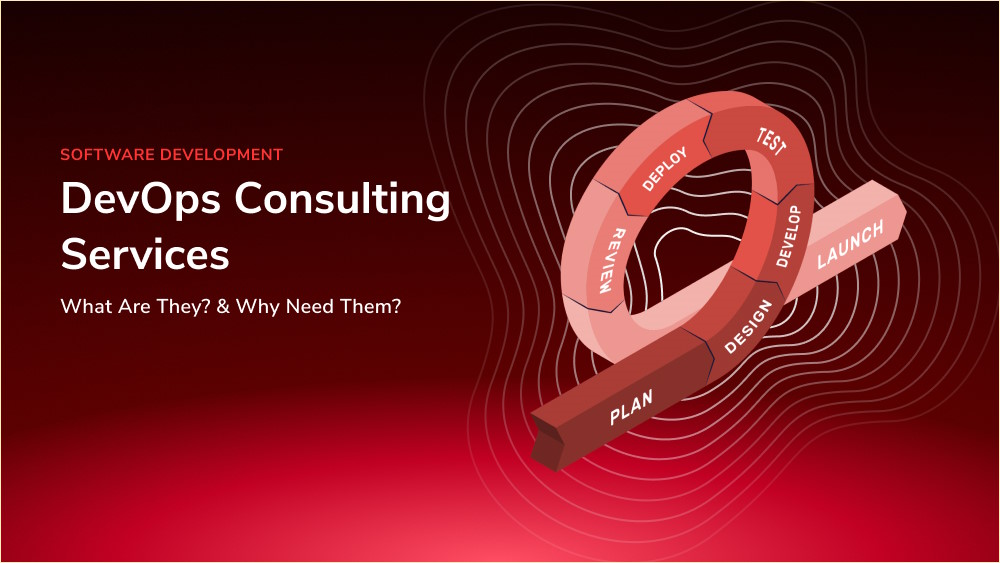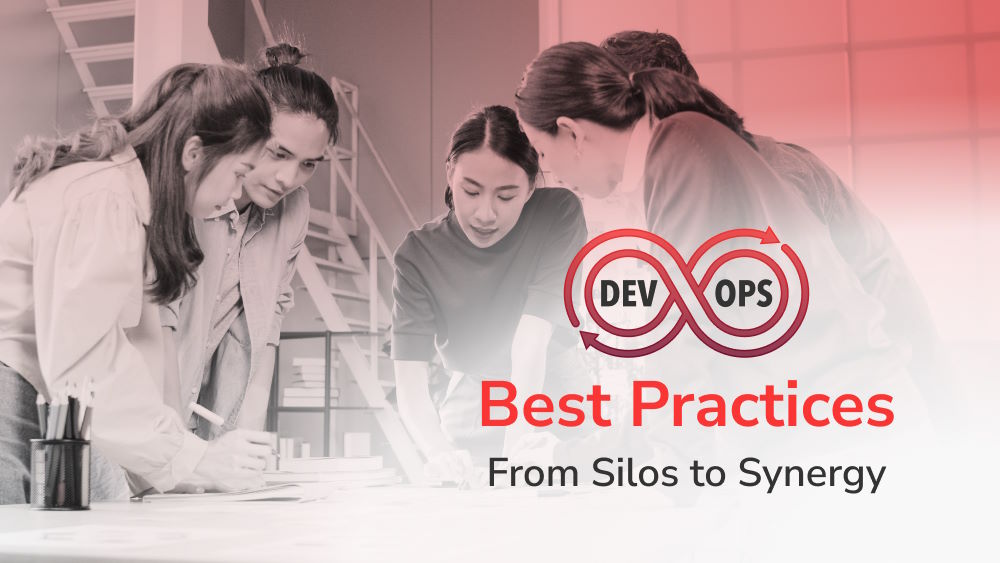DevOps Consulting Services: What Are They? & Why Need Them?

Content Map
More chaptersIn recent years to come, the DevOps strategy has come to prominence as an optimal methodology that streamlines and accelerates the software development processes and drives the best business outcomes. Simply put, DevOps practices are brought in to foster seamless collaboration between development and operations teams to ensure that all tasks are effectively executed and delivered on time. It is about developing, testing, and releasing software in a continuous manner while collaborating with the entire team involved. DevOps implementation is eventually aimed to enable high performance, continuous development, continuous integration, and continuous delivery of software products.
The State of DevOps Report by Puppet in 2021 indicated that high-performing organizations that have adopted DevOps practices are twice as likely to exceed their profitability, productivity, and market share goals. In addition, DevOps has been shown to reduce time-to-market, lower failure rates, and improve overall product quality. Many companies across a range of industries, including technology, healthcare, finance, and retail, have adopted DevOps solutions in some form or another. In fact, Forbes reports that the global DevOps market is expected to reach $17 billion by 2026.
Overall, DevOps culture has soon become an integral part of the modern business strategy. DevOps adoption, nevertheless, is challenging for a number of reasons. It is no surprise businesses with no experts in this field have to seek assistance with DevOps initiatives, which is why DevOps consulting services are in high demand nowadays. And the advent of a large number of service providers, some proclaim themselves as top DevOps consulting companies, is no surprise either. In this, let’s delve into everything about DevOps consulting.
What Is DevOps Consulting?

The term DevOps consulting literally means what its name implies: A service focuses on providing expert guidance and advice to organizations on adopting and implementing DevOps practices within an existing system.
Businesses that have already adopted DevOps or are planning to do so can benefit greatly from an experienced DevOps consulting company and its experts who can guide them through each step of the process and ensure a successful DevOps journey.
What Do DevOps Consultants Do?

Unlike in-house DevOps engineers, third-party consultants can bring in an element of unbiased objectivity, which is resourceful for the successful DevOps journey of a company or organization. They are experts in DevOps and can advise on the best processes to use, the tools that will help streamline operations, and how to optimize organizational resources for cost-effectiveness.
In brief, these advisors are responsible for designing and implementing customized DevOps solutions that align with the client’s business goals. Their duties encompass creating documentation for various aspects of the project, collaborating with development teams to create a conducive environment for rapid code iterations, monitoring application performance, and troubleshooting issues. Additionally, they provide recommendations for process improvements, support the implementation of new applications by conducting testing and quality assurance, identify and mitigate security threats, develop scripts or tools for automation, and maintain the integrity of an organization’s computing infrastructure through regular patching.
At the end of the day, a DevOps consulting company and its agents will do everything within their power to ensure you adopt DevOps practices in an efficient and expeditious manner.
DevOps consultants often provide on-site consulting services that can help you understand the basics of DevOps and determine whether it’s a good fit for your organization. Generally speaking, such DevOps services are separated into three different types:
- Technical Consulting
- Strategic Consulting
- Operational Consulting
Each type covers different areas of DevOps implementation.
Technical Consulting
As its name suggests, this service aims to provide technical expertise and guidance to assist organizations in designing and developing a consistent DevOps strategy. The ultimate goal is to implement DevOps principles and automation tools properly to create a more efficient, automated, and collaborative software development life cycle.
CI/CD Pipeline
Continuous Integration, or CI, is a development practice in which software developers merge their code changes into a shared repository in a frequent manner, usually multiple times a day. An automated build system verifies each integration by compiling the code and running tests. This approach helps to detect and fix integration issues early. Continuous Deployment (CD) is an extension of Continuous Integration that automates the software releases of new versions. It ensures that the code is always in a releasable state and reduces the time between development and deployment.
CI/CD pipeline consulting services are focused on helping organizations build automated pipelines for seamless software deployment and release. The DevOps experts give guidance to set up the CI/CD pipeline, configuring tools like Jenkins and Kubernetes, and working with other automation processes.
Cloud Computing Services
Cloud computing is a powerful enabler for DevOps teams to collaborate, build, and deploy applications at scale. The DevOps consulting firm helps the organization plan its cloud strategy, migrate its applications, servers, and databases from on-premises data centers to public cloud platforms such as AWS and Azure, and optimize costs. The consultants are also familiar with different cloud models, including Infrastructure-as-a-Service (IaaS), Platform-as-a-Service (PaaS), and Software-as-a-Service (SaaS).
Infrastructure as Code (IaC)
Infrastructure as Code or infrastructure automation is a practice where infrastructure management tasks are automated using code and version control systems. IaC allows for the provisioning, configuration, and management of infrastructure components, such as servers, networks, and storage, through code templates. This DevOps approach enables consistency, repeatability, and scalability of infrastructure deployments.
Monitoring & Logging
Monitoring and logging are essential components of the DevOps approach. They help ensure the performance, availability, and security of applications and infrastructure. As part of a DevOps consulting service, monitoring and logging involve the implementation and optimization of tools and processes to collect, analyze, and visualize data from various sources within an IT environment. This enables organizations to proactively identify and address issues, optimize system performance, and make data-driven decisions.
Strategic Consulting
This type of service is geared toward helping businesses to identify pain points in their existing processes and devise a DevOps assessment roadmap. At this point, consultants define their goals, objectives, and long-term plans for successful DevOps implementation. The consultant then makes sure that a suitable set of DevOps tools and methods are chosen to ensure that the organization can achieve the desired results.
DevOps Maturity Assessment
The DevOps maturity model is a systematic evaluation of an organization’s current DevOps practices, capabilities, and culture to determine their maturity level. In this assessment, experts will work with development and operation teams to audit the existing processes, identify weak points, and create an actionable plan to improve the organization’s overall DevOps maturity. The assessment also helps identify the areas where resources can be allocated to gain the most value.
DevOps Governance & Compliance
The adoption of DevOps principles and practices requires the establishment of a robust governance framework. This is what a DevOps consultant will aid you with. The consultants assist the organization in developing and implementing a set of processes, regulations, and policies that control how applications are developed, tested, deployed, and managed on their platform. This ensures a safe environment that complies with industry regulatory standards.
In addition, they also provide guidance on how to best manage changes and ensure compliance with industry standards. The goal is to help organizations achieve agility and scalability without compromising security or compliance. By incorporating these techniques, organizations can ensure that their DevOps environment meets the required standards for safe and secure operations.
Training & Coaching
In addition to consultancy services, consultants also offer DevOps training and skill development programs. These aim to educate business owners and their teams on the principles and practices of DevOps, helping them to understand how its technologies and approaches can benefit their businesses. The training may include topics such as software development life cycle (SDLC) best practices, DevOps tools and processes, configuration management, cloud architecture, and deployment automation.
Process Improvement & Workflow Design
Process improvement is another core service offered by DevOps consultants. This involves analyzing and optimizing existing workflows, identifying process bottlenecks, and providing highly effective solutions to streamline development processes. The consultant gives guidance on designing a workflow that integrates all the necessary components, such as tasks, control points, and feedback loops, for the successful implementation of DevOps practices.
Operational Consulting
In this area of service, DevOps experts work with an organization’s IT department, development team, and other stakeholders to monitor, optimize, and iterate their DevOps processes (such as performance monitoring, capacity planning, and incident response management) to ensure peak efficiency. Additionally, consultants provide guidance and insights on how to build a culture of collaboration between development and operations teams for successful DevOps projects.
Configuration Management
It is a critical aspect of managing and maintaining applications and infrastructure components in a consistent and reliable state. Configuration management involves the process of tracking, controlling, and managing changes to the configurations of software, hardware, and other system components. This helps ensure that all system elements are well-documented, versioned, and can be easily restored to a known state if needed.
DevOps Project Recovery
DevOps project recovery consulting is a specialized service to rescue and revitalize troubled or failing DevOps projects. These projects may be experiencing issues such as missed deadlines, budget overruns, poor performance, low-quality deliverables, or a lack of alignment with business goals. Consultants work closely with the organizations to identify the root causes of the problems, develop a plan to address them and guide the implementation of corrective actions.
Why Turn to DevOps Consulting Companies?
The IT culture war is coming to its peak as businesses of all sizes and shapes are jumping on the DevOps bandwagon. On the surface, DevOps culture seems to be easily adopted as defined. However, the reality is on the contrary since there will be various challenges awaiting them and tampering with their initial enthusiasm. Accordingly, businesses, particularly “DevOps rookies,” have many good reasons to partner with a leading DevOps consulting company. Here are some tangible ones:

Access to Expertly Matched Talent
For those companies with little or no related expertise on the subject, DevOps adoption can be adventurous and full of challenges. Therefore, they are in need of external hands to lead the way, not anyone but the experts.
DevOps consulting companies have access to a pool of experts and engineers who are well-versed in the methodology, principles, tools, and technologies required for effective implementation. As such, they can tailor the roadmap for your organization or a DevOps team with the right blend of skills to ensure your success is liable to your organizational objectives, scalability needs, and budget.
Mitigate the Risks of Ineffective Adoption
DevOps bring a great deal of value to business operations; however, companies may easily fall into the trap of making costly mistakes if they try to adopt DevOps without expert guidance. Ineffective adoption can lead to increased complexity, security threats, and cost overruns that could derail the progress of your organization. A DevOps consultant will be able to lead your endeavor in the right direction and provide guidance on how best to manage these risks and avoid any costly mistakes.
Quickly Gain the Benefits of DevOps
Consultants have experience with DevOps implementation in different situations and are well-versed in the best practices needed for success. They understand what works and doesn’t, which helps reduce the time it takes your organization to gain the actual benefits from the DevOps initiative. With their help, you can unlock the full potential of your development teams faster than trying to figure it out yourself.
Cost Savings and Increased ROI
Enlisting the services of a DevOps consultant is highly cost-effective, as it helps organizations save money and time. Furthermore, it helps companies maximize their DevOps ROI by deploying the right tools, processes, and strategies to get the most out of their investments.
Is your IT department ready for DevOps? If yes, find the right partner and get started. Why look elsewhere? Orient Software – One of the best DevOps consulting companies is just a hop, skip, and a jump away. Consult with us for professional guidance and support on DevOps culture as well as other IT outsourcing services.







